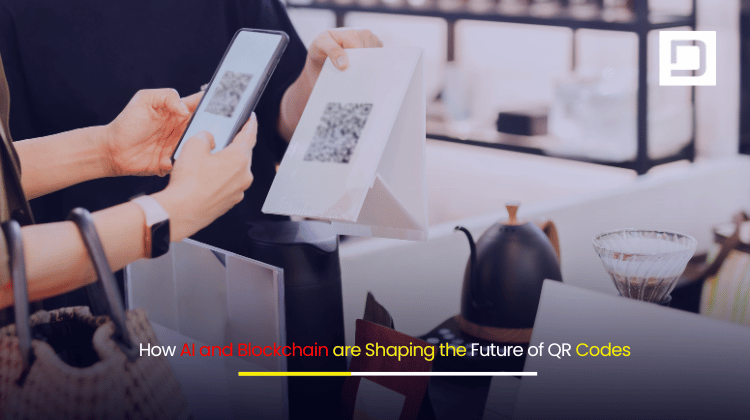How AI and Blockchain are Shaping the Future of QR Codes
In the digital age, QR codes have become ubiquitous, enabling users to access websites, make payments, and authenticate transactions effortlessly. But as technology evolves, so too do the ways we utilize QR codes. Two emerging technologies—Artificial Intelligence (AI) and Blockchain—are beginning to play a significant role in transforming the way we interact with QR codes. These innovations promise to make QR codes more secure, intelligent, and dynamic, opening up new possibilities for businesses and consumers alike.
In this blog, we will explore how AI and blockchain are shaping the future of QR codes, why this combination is essential, and how businesses can leverage these advancements to create more efficient and secure QR code experiences.
Understanding QR Codes: A Brief Overview
Before delving into how AI and blockchain are influencing QR codes, it’s important to understand the basic functionality of QR codes.
A QR (Quick Response) code is a type of two-dimensional barcode that stores data, which can then be scanned and decoded by mobile devices. Unlike traditional barcodes, which can store only limited information, QR codes can hold a large amount of data, including URLs, contact information, and payment details.
QR codes are often used in a variety of industries, including retail, marketing, payment systems, and logistics. They allow businesses to deliver information instantly to consumers and facilitate seamless interactions. Over time, QR codes have become a powerful tool for businesses looking to enhance customer experiences, streamline operations, and drive engagement.
The Role of AI in the Evolution of QR Codes
Artificial Intelligence (AI) is reshaping numerous industries, and QR codes are no exception. The integration of AI into QR code technology brings several advancements that improve both functionality and security.
1. Smart QR Codes with AI-Powered Data Analysis
AI can enhance the functionality of QR codes by enabling real-time data analysis and predictive insights. AI-powered QR codes can monitor how and when they are scanned, as well as where the scans are taking place. By analyzing user behavior, businesses can tailor content based on the preferences of consumers.
For example, if a customer frequently scans QR codes on a particular product type, AI algorithms can push personalized promotions or product recommendations through the same QR code, driving further engagement.
Additionally, AI enables dynamic QR codes that adapt to specific conditions. For example, AI can modify the URL or content of a QR code based on location, time of day, or weather. A QR code for a restaurant could offer a special discount during lunchtime or provide different product recommendations based on the user’s preferences.
2. AI-Powered QR Code Authentication
Security is one of the biggest concerns surrounding the use of QR codes, particularly in the payment and authentication sectors. Traditional QR codes are vulnerable to malicious attacks, such as QR code phishing, where attackers replace legitimate QR codes with counterfeit ones.
AI-powered QR codes can provide advanced security features, such as biometric authentication and machine learning algorithms to detect fraudulent activity. AI can analyze patterns of scanned codes and identify unusual behavior that may suggest fraud. If a QR code is altered or leads to a suspicious destination, the AI system can immediately alert the user, preventing malicious attacks.
By integrating facial recognition or fingerprint scanning with AI-powered QR codes, businesses can ensure secure transactions and protect user data from being intercepted or compromised.
3. Voice and Image Recognition for QR Code Scanning
AI has the capability to integrate voice and image recognition with QR code scanning. This is particularly useful for users who may have difficulty scanning QR codes traditionally, such as people with visual impairments. AI-driven voice assistants can help identify the contents of QR codes through speech, making QR code interactions more inclusive and accessible.
For instance, AI can enable a QR code scanner to recognize and describe the content within the code using voice commands. This makes it easier for users to interact with QR codes without needing to physically scan them, increasing both accessibility and convenience.
4. Enhancing User Experience Through AI
AI is being used to improve the overall user experience with QR codes. By analyzing past interactions and preferences, AI can tailor the information or offers presented to users via QR codes. This is particularly beneficial in marketing campaigns, where businesses can deliver personalized experiences and offers based on customer behavior.
For example, a customer may scan a QR code at a retail store to access a special discount, but based on the customer’s previous purchase history or browsing data, AI can offer a more tailored deal. This personalization can lead to higher conversion rates and increased customer loyalty.
Blockchain’s Impact on QR Codes
Blockchain technology is best known for its association with cryptocurrency, but it has far-reaching implications beyond digital currencies. Blockchain’s decentralized and immutable nature can bring significant improvements to the security, transparency, and traceability of QR codes.
1. Ensuring Data Integrity with Blockchain
One of the major challenges associated with QR codes is the potential for data tampering. Malicious actors may alter the contents of a QR code, leading to fraudulent activities or a compromised user experience. Blockchain solves this issue by providing a decentralized ledger that records and verifies every action made on the QR code.
Each time a QR code is created or scanned, the blockchain can log the transaction in a transparent and immutable ledger. This ensures that the data stored in the QR code cannot be altered without leaving a trace, providing a higher level of confidence for users. Blockchain-based QR codes can be used in a variety of applications, including secure payment systems and digital identification processes.
2. Securing Digital Payments Through Blockchain
Blockchain has revolutionized the world of digital payments, and its integration with QR codes is helping to create a more secure environment for transactions. With blockchain, payments made through QR codes are validated on a decentralized network, reducing the risks of fraud and ensuring the integrity of the transaction.
When a customer scans a blockchain-enabled QR code, the payment or transaction details are verified in real-time through the blockchain network. The transaction is then recorded in an immutable ledger, ensuring that it cannot be altered or tampered with. This creates a transparent and secure environment for both businesses and consumers.
For example, a QR code used for cryptocurrency payments can leverage blockchain to ensure secure and instant processing of transactions. Similarly, QR codes used for loyalty programs or reward systems can be secured through blockchain, preventing fraudulent claims and ensuring the accuracy of rewards.
3. Supply Chain Transparency and Tracking
Blockchain can provide enhanced transparency in industries where supply chain tracking and authenticity are critical. QR codes can be used to store and display key information about the products being sold, including their origin, manufacturing process, and shipment history.
When integrated with blockchain, QR codes allow consumers to trace the entire supply chain journey of a product. By scanning the QR code, consumers can access information stored on the blockchain about the product’s history, such as whether it was ethically sourced, manufactured under fair labor conditions, and whether it has passed regulatory certifications. This enhances transparency and trust in the products being sold.
4. Smart Contracts and Automated Transactions
Blockchain-based QR codes can also integrate smart contracts—self-executing contracts that automatically enforce and execute terms when conditions are met. For example, when a customer scans a QR code to make a payment or access a service, a smart contract could automatically trigger the transaction, ensuring that payment is processed only if certain conditions are met.
This can eliminate the need for intermediaries in many transactions, leading to faster, more efficient, and cost-effective processes. Businesses can use smart contracts and blockchain-based QR codes to automate various operations, from payments to delivery tracking, increasing efficiency and reducing the chances of human error.
The Synergy of AI and Blockchain in QR Codes
The combination of AI and blockchain can unlock new potential for QR codes, making them not only more secure but also smarter and more capable of offering personalized experiences.
For example, AI and blockchain can work together to enhance QR code security. While blockchain ensures that QR code data is immutable and tamper-proof, AI can help identify and mitigate potential threats by analyzing behavior and patterns in real-time. This dual layer of security is particularly beneficial for industries that require high levels of trust, such as healthcare, finance, and government.
Moreover, AI and blockchain can enhance the functionality of QR codes in supply chain tracking, digital payments, and loyalty programs. While blockchain ensures transparency and security, AI can personalize experiences and optimize QR code interactions based on user behavior and preferences.
Conclusion
AI and blockchain are transforming the way businesses and consumers interact with QR codes, making them smarter, more secure, and more efficient. By integrating AI-powered data analysis, predictive insights, and security features with the immutable nature of blockchain, businesses can create QR code experiences that are not only more personalized but also more transparent and trustworthy.

For businesses looking to take advantage of these advancements, it’s crucial to partner with a technology provider like Depex Technologies. Our expertise in AI, blockchain, and QR code development can help you stay ahead of the curve and deliver cutting-edge experiences to your customers. Whether you are looking to integrate secure payment systems, improve user engagement, or create innovative supply chain solutions, Contact Depex Technologies to help you unlock the future of QR codes.






